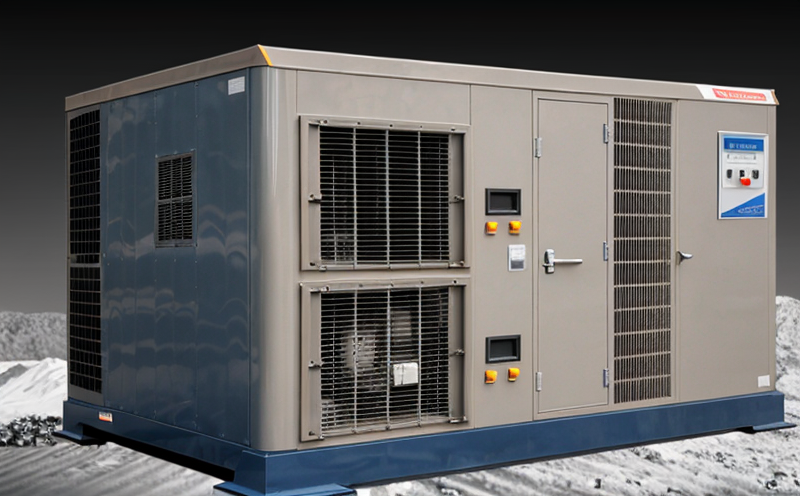JEDEC JESD22-A147 Accelerated Life Testing with Thermal Stress
The JEDEC JESD22-A147 standard is a critical tool in semiconductor and microchip testing, designed to evaluate the reliability of electronic components under extreme thermal conditions. This accelerated life test simulates real-world stressors to predict long-term performance and durability without requiring years of actual use.
Thermal stress can have profound effects on the integrity of semiconductors and microchips. Extreme temperatures can cause materials to expand and contract, leading to mechanical fatigue or even failure. This is especially pertinent in sectors where components are exposed to fluctuating environmental conditions, such as automotive electronics, aerospace instrumentation, and industrial control systems.
The JEDEC JESD22-A147 test method involves subjecting the component to a series of temperature cycles that exceed normal operating conditions. These cycles are designed to accelerate aging processes and reveal any latent defects or weaknesses in the design and manufacturing process. By replicating these stressors, engineers can identify potential issues early in the product lifecycle, allowing for timely corrections and improvements.
The standard specifies a range of test parameters that must be strictly adhered to ensure accurate results. These include temperature ranges from -40°C to 150°C, cycling rates, and dwell times at each temperature point. The tests are conducted in controlled environmental chambers capable of maintaining precise temperature profiles with minimal variance.
Specimen preparation is crucial for the success of these tests. Components must be properly mounted on test fixtures that can withstand the rigors of the thermal cycles without introducing additional stresses. The choice of fixturing and mounting materials should not interact chemically or mechanically with the component under test.
The instrumentation used in JEDEC JESD22-A147 testing is sophisticated and precise. Temperature sensors, data acquisition systems, and monitoring equipment are employed to track temperature changes and ensure compliance with specified conditions. Data analysis software is used to interpret results, providing insights into the thermal stability of the components.
After completion of the test, detailed reports are generated summarizing the performance of each component throughout the stress cycles. These reports provide critical information on any failures observed during testing, allowing for targeted improvements in design and manufacturing processes.
The reliability gained from JEDEC JESD22-A147 testing is invaluable to quality managers, compliance officers, R&D engineers, and procurement teams. It ensures that products meet stringent industry standards, enhancing overall product quality and customer satisfaction. This testing method plays a vital role in reducing warranty claims and recalls, thereby protecting the reputation of manufacturers.
By investing in JEDEC JESD22-A147 accelerated life testing with thermal stress, organizations can achieve significant cost savings by identifying and rectifying design flaws early in the development process. This proactive approach not only enhances product reliability but also contributes to a safer and more efficient end-product.
Why It Matters
The importance of JEDEC JESD22-A147 accelerated life testing with thermal stress cannot be overstated in the semiconductor industry. This method provides critical insights into how components will perform under extreme conditions, which is essential for ensuring long-term reliability and durability.
- Identifies latent defects early: By simulating real-world conditions, this test helps detect design flaws that may not be apparent during routine testing.
- Saves time and resources: Accelerated life testing allows engineers to identify potential issues before products reach the market, reducing development cycles and associated costs.
- Promotes product safety: Ensuring components can withstand extreme temperatures reduces the risk of failures in critical applications such as automotive electronics and aerospace instrumentation.
The results of JEDEC JESD22-A147 testing are not only beneficial for manufacturers but also for consumers. Reliable products mean fewer recalls, lower maintenance costs, and increased trust in brand quality.
In conclusion, the significance of this test cannot be understated. It is a cornerstone of modern semiconductor reliability engineering, providing essential data that drives continuous improvement in product design and manufacturing processes.
Customer Impact and Satisfaction
The implementation of JEDEC JESD22-A147 accelerated life testing significantly impacts customer satisfaction by enhancing the overall quality and reliability of semiconductor products. By identifying and addressing potential issues early in the development process, manufacturers can ensure that their products meet or exceed industry standards.
- Increased trust: Reliable products build long-term relationships with customers and improve brand reputation.
- Reduced warranty claims: Early detection of flaws minimizes the need for customer support and replacements, leading to higher satisfaction rates.
- Enhanced product safety: Ensuring components can withstand extreme thermal conditions reduces risks in critical applications like automotive electronics and aerospace instrumentation.
In conclusion, JEDEC JESD22-A147 testing is not just a technical requirement but also a strategic investment that contributes to long-term business success by fostering customer confidence and satisfaction.
Use Cases and Application Examples
The application of JEDEC JESD22-A147 accelerated life testing spans multiple industries, including automotive electronics, aerospace instrumentation, industrial control systems, and consumer electronics. Here are some specific use cases:
- Automotive Electronics: Ensuring the reliability of components in vehicles exposed to wide temperature ranges.
- Aerospace Instrumentation: Evaluating the durability of components used in space missions where extreme temperatures are a constant challenge.
- Industrial Control Systems: Testing the performance of components in harsh environments such as factories and construction sites.
- Consumer Electronics: Guaranteeing that products like smartphones and home appliances can withstand varying environmental conditions.
In each of these sectors, JEDEC JESD22-A147 testing plays a crucial role in ensuring product reliability and performance. By adhering to this standard, manufacturers can confidently deliver high-quality components that meet the demands of their customers.





